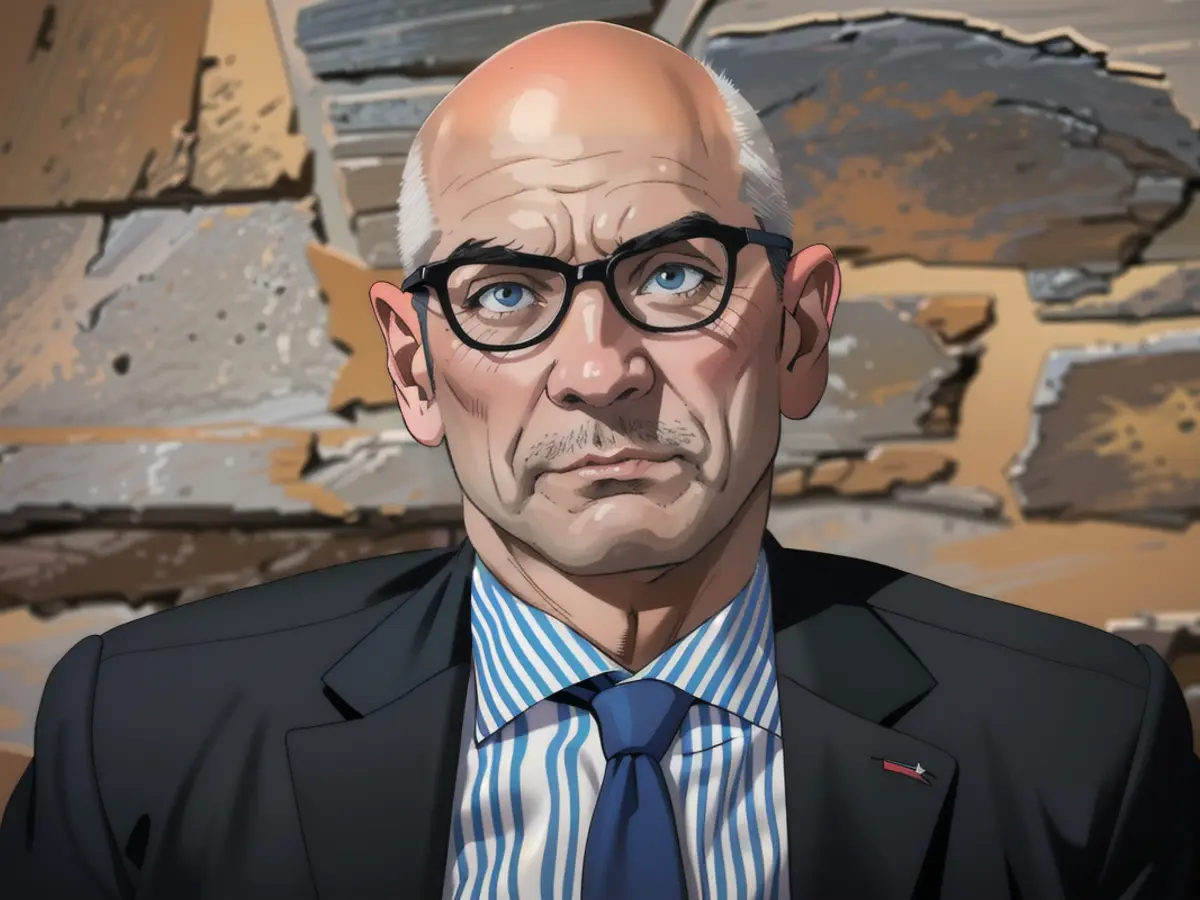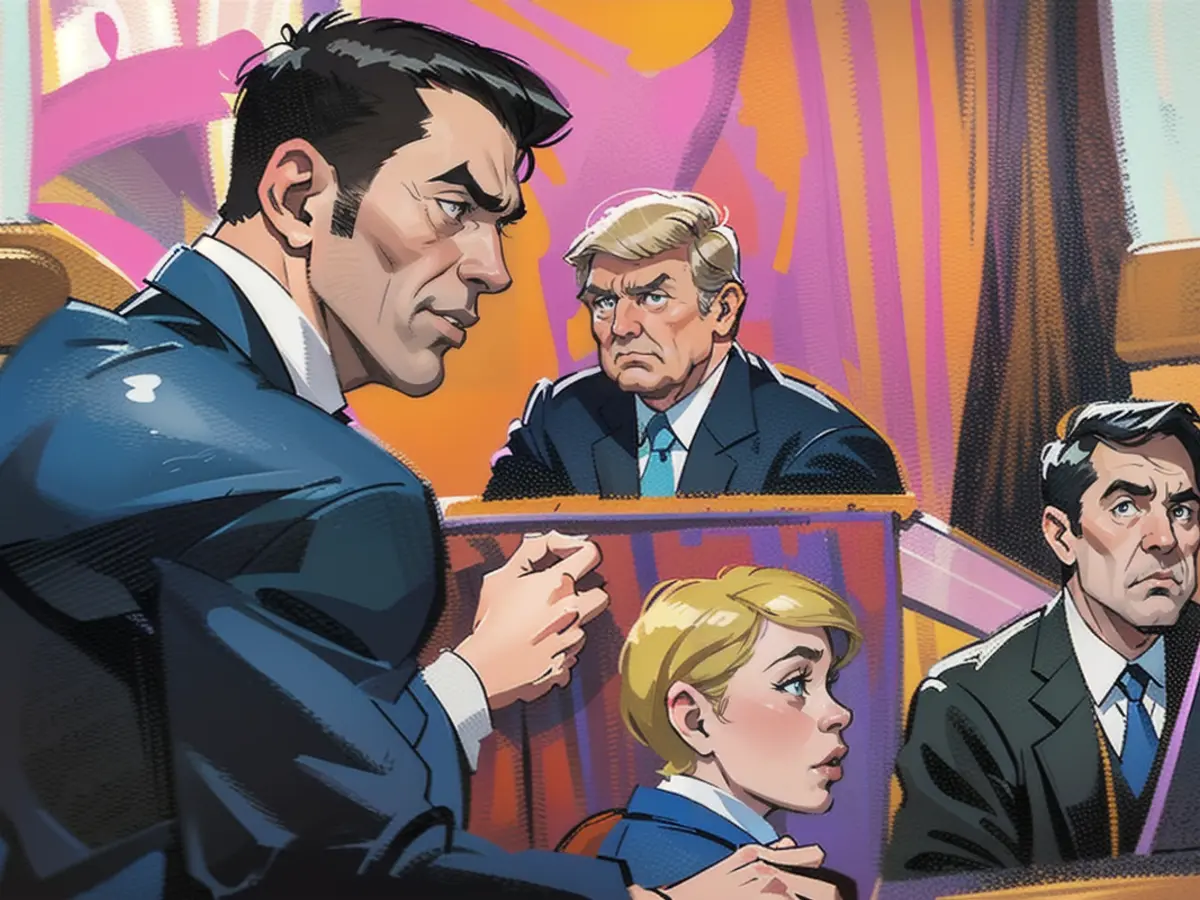It's bizarre that Americans aren't allowed to witness the Trump trial directly.
Seeing these images made me relate to the events of that awful time in a deeper way. It's like the saying goes, "If it's not on film, it didn't happen." Witnessing things with our own eyes gives them a greater impact.
Now, as the first criminal trial of an American president unfolds, I'm getting angrier and angrier about not being able to witness this historic moment for myself.
It's ironic that TV, which played such a major role in making us a visual society in the second half of the 20th century, is now stopping us from seeing what could be one of the most important political events of the 21st.
Donald Trump is on trial for allegedly falsifying business records to hide hush money paid to porn star Stormy Daniels just before the 2016 presidential election. This trial could have significant implications for this year's White House race.
I want to have personal knowledge of what I'm seeing during this trial in a year that might decide the future of our country - maybe even the whole world. But outdated New York state laws that aimed to keep courtrooms neat and tidy back in the early 1900s are preventing television cameras from being present in the courtroom.
So, we're left with sketchy drawings - some good, some not so - to give us an idea of how the witnesses, lawyers, and judge looked during the trial.
I find it helpful to read about the trial in the newspaper and listen to the pundits' analysis on TV. But no matter how much I absorb what they saw, it's not as effective as seeing things for myself. After all, there's a lot of disagreement among the commentators about what really happened during the trial.
In ten years, will anyone remember the specific details of Daniels' insults towards Trump or how Michael Cohen came across during his direct testimony? Will anyone remember how his testimony might have weakened the prosecution's case with an unintentional mistake?
If we could see the events unfold in real-time and with our own eyes, our views on what happened in the courtroom might be much clearer.
With a massive audience potentially tuning in to watch the lives of these tabloid celebrities unfold, it's a shame that we're limited to hearing secondhand accounts from reporters or reading transcripts in newspapers.
The jurors decide Trump's guilt or innocence in this "hush money" case, but the American public is part of a larger jury that determines who will be president after the votes are counted in 2024.
I believe we have the right to see Candidate Trump under pressure in a setting he didn't choose. We deserve to watch him on the witness stand, with the possibility that he might opt to testify. We've seen how easy it is to broadcast trials and other court proceedings, as most states already allow cameras in the courtroom.
Critics argue that TV can distort reality and be manipulated, making a strong case for keeping cameras out of the courtroom. However, there are times when TV captures a person's essence in a manner that words cannot.
Consider Senator Joseph McCarthy during the Army-McCarthy hearings in 1954. In just a few moments of TV footage, millions of viewers could sense the dark and divisive nature of this Republican senator from Wisconsin, a modern-day counterpart to Trump.
Another argument for banning cameras is that they might turn trials into entertainment spectacles. The 1995 O.J. Simpson trial is often mentioned as an example of this. And while it was entertaining, it was truthfully that.
Yet, there's a lot to be said about the power of TV to present a person's character in a way that no words can match.
The murder trial had a significant impact on millions of spectators, conveying relevant truths about societal aspects. The primary lesson was that individuals perceive situations based on their personal histories, which include factors like social class, family, race, ethnicity, religion, and education. The notion that there's a single America doesn't exist; rather, there are multiple Americas that must coexist for a more harmonious nation.
The media exploded with commentary on the "Black, White Divide" following the trial's conclusion, as if it had just emerged. However, it wasn't new. The trial just revealed these realities to millions of viewers, including editors, producers, and individuals from different socio-economic backgrounds.
The trial improved the collective understanding of culture, justice, and race. The visual memories of the defendants (e.g., Simpson, Cochran, etc.) serve as reminders of these valuable lessons viewed on TV.
Unfortunately, we cannot access the material from the historic trial during the 2024 presidential election. Likewise, future generations will miss out on discovering crucial insights from this momentous legal matter. accessing the actual footage. However, the trial is broadcasted in an overflow room at the court, raising the possibility of a video record being saved. Albeit, this record would likely be under the court's control. I sincerely hope to see it eventually, if possible.
The closed-door deliberations in Trump-related court cases are problematic since they further divide the nation. They deny Americans a glimpse into what justice looks like when applied to someone who had occupied the highest office. By withholding this evidence, we deprive ourselves of understanding how our system occasionally fails to provide impartiality and uphold the rule of law. There's a considerable societal failure in not allowing the people to witness this.
Since the mid-20th century, it's been technologically feasible to allow all citizens to observe a crucial legal battle, especially in cases involving a former president who has occasionally demonstrated disregard for the legal system. It's high time we take advantage of this capability to fortify our democratic structure.

Read also:
- This will change in December
- Dikes withstand water masses so far - Scholz holds out the prospect of help
- Fireworks and parties ring in 2024 - turn of the year overshadowed by conflicts
- Attacks on ships in the Red Sea: shipping companies avoid important trade route
I strongly believe that allowing television cameras in the courtroom during trials like Donald Trump's would provide a more accurate representation of events, reducing the reliance on biased or partially accurate secondhand accounts. This transparency could help shape more informed public opinions.
Despite the controversy surrounding the potential distortion of reality through television, it is undeniable that seeing events unfold live can significantly impact our understanding and interpretation of the situation. Therefore, it would be beneficial to consider ways to mitigate the potential risks, rather than completely deny the public access to such trials.
Source: edition.cnn.com







